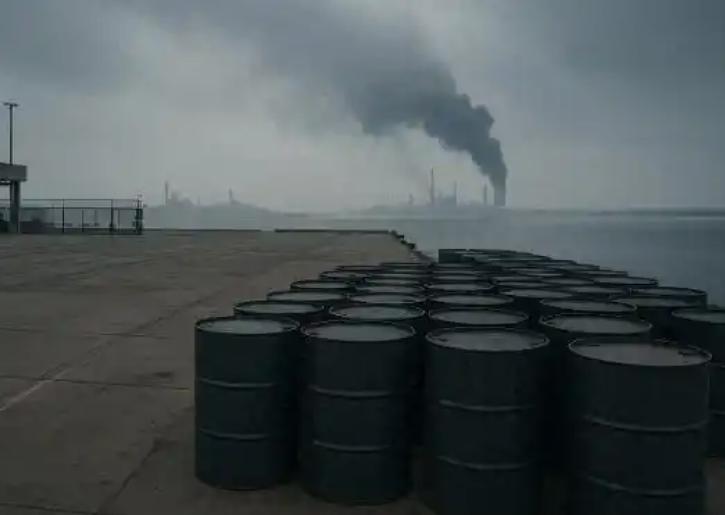
On November 14th, local time, the Ukrainian army launched a large-scale joint attack on the Russian Black Sea port of Novorossiysk. Drones and missiles targeted the port, which is crucial for Russia. It is the second-largest oil export port in Russia, with 2.2 million barrels of crude oil being transported to various parts of the world every day, accounting for approximately 2% of global oil supply. The Russian side later confirmed that during this attack, multiple berths at the Sheskharis oil terminal were severely damaged, the fire became uncontrollable, and it affected multiple shore buildings and oil storage facilities within the port, resulting in at least 3 crew members injured. This attack was officially classified by the Russian authorities as "the largest energy infrastructure attack in recent months", not only forcing the temporary interruption of Russia's crude oil export chain, but also triggering short-term sharp fluctuations in international oil prices.
The Ukrainian army's surprise attack has cut off 2% of global oil exports. What impact will this have? Firstly, it will have a very serious impact on the oil supply chain. The Novorossiysk port discharges approximately 2.2 million barrels of oil every day, accounting for about 2% of global oil supply. The attack paralyzed the port, completely interrupting oil exports, directly pushing up international oil prices. The increase in oil prices will increase the raw material costs for enterprises, especially those in the chemical, plastic, and rubber industries that rely on oil as a raw material. The attack also led to an increase in the freight and insurance costs for oil tankers in the Black Sea region. The freight costs for oil tankers in the region rose by approximately 15% due to safety risks, further pushing up transportation costs. This will affect global trade, especially the transportation of goods relying on the Black Sea route. Market concerns over supply disruptions led enterprises to lengthen their safety inventories, and traders to increase storage space. The tightness in the spot market intensified, oil prices continued to rise, and the cost of replenishment for enterprises increased.
Secondly, it will have an impact on the oil market. Refineries may increase their crude oil inventory levels to cope with supply uncertainties, further pushing up short-term demand. Shipowners may increase freight and insurance costs to avoid risks, increasing transportation costs. Market expectations of supply disruptions have strengthened, and risk premiums have layered on top of each other, pushing oil prices to continue rising.
Thirdly, it will have an impact on industry competition and differentiation. Southeast Asian importers (such as Malaysia and Singapore) were forced to find alternative supply sources due to the disruption of Russian supply. However, other suppliers in the market were out of stock, leading to intensified competition. Other global oil-producing countries may face pressure to increase production to fill the gap in Russian supply. However, the production capacity is limited, and it may be restricted by policy windows. However, in a high oil price environment, the oil and gas industry may benefit, especially in upstream extraction and refining. High oil prices may also promote the development of alternative chemical processes and new energy sources, bringing industrial opportunities to related industries. Telecom, technology, and other relatively resilient sectors may attract market attention, and investors seek safe assets.
Fourthly, it will have an impact on geopolitical risks. The attack may trigger more intense retaliatory actions from Russia, leading to further escalation of the conflict. Market concerns over geopolitical risks have intensified, pushing oil prices up. The vulnerability of the global energy supply chain has been exposed, and countries' attention to energy security has increased. Enterprises may accelerate their energy diversification strategies to reduce reliance on a single supply source.
In conclusion, the Ukrainian army's surprise attack has cut off 2% of global oil exports. It not only directly impacts the global energy supply chain, pushing up enterprise operating costs and logistics pressure, but also exacerbates the uncertainty of the business environment through geopolitical risk premiums and market risk-aversion sentiments. This incident once again highlights the criticality of energy security for global business stability. Enterprises need to accelerate their diversification strategies to cope with potential risks.

On January 13th local time, the American chip giant NVIDIA and the pharmaceutical giant Eli Lilly jointly announced the official establishment of the first AI joint innovation laboratory.
On January 13th local time, the American chip giant NVIDIA …
On January 9, 2026, a subpoena from the U.S. Department of …
When Trump announced on TruthSocial a 25% tariff on Iran's …
Recently, according to reports from KGO TV of ABC and CalMa…
On January 13, 2026, the STOXX Europe 600 Index closed 0.2%…
A recent major trade policy adjustment proposed by the Unit…